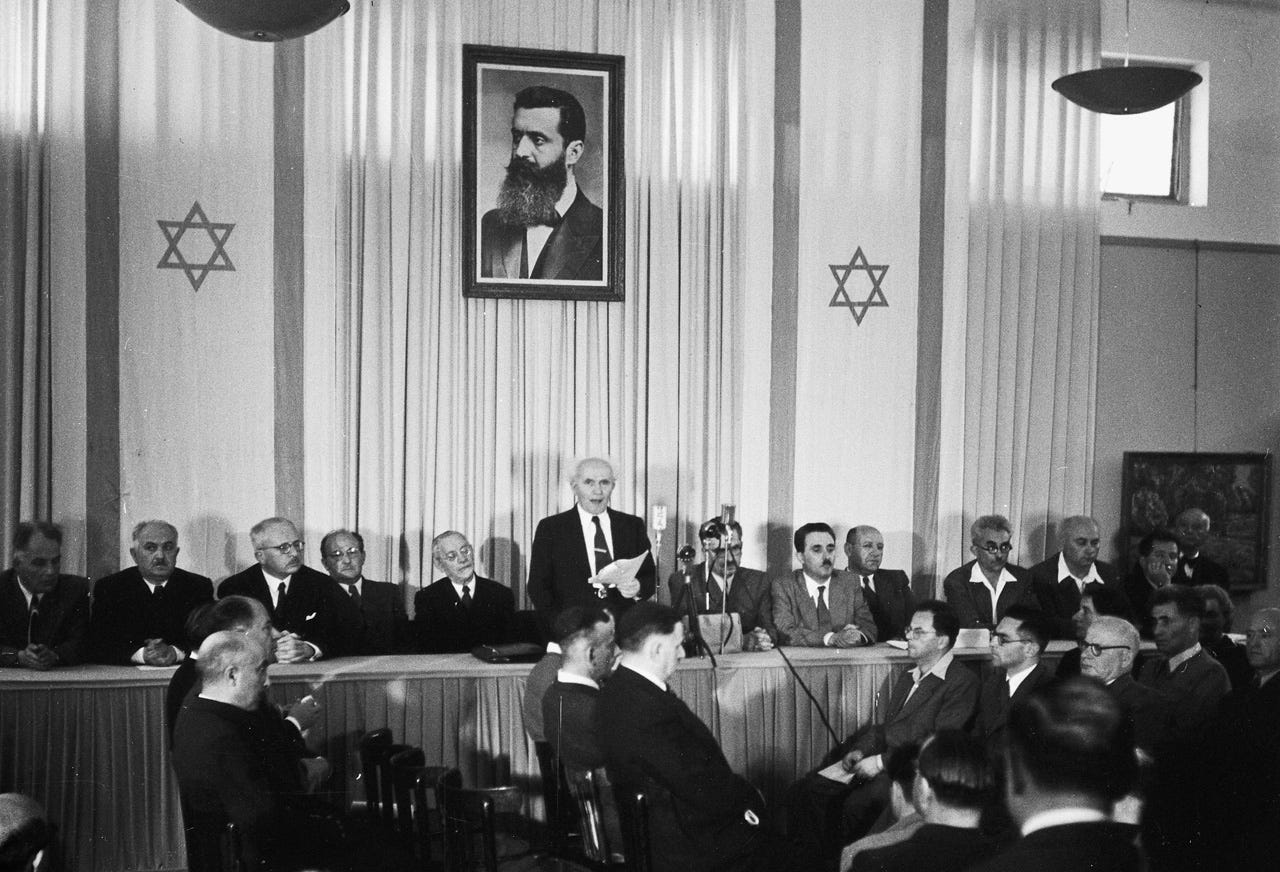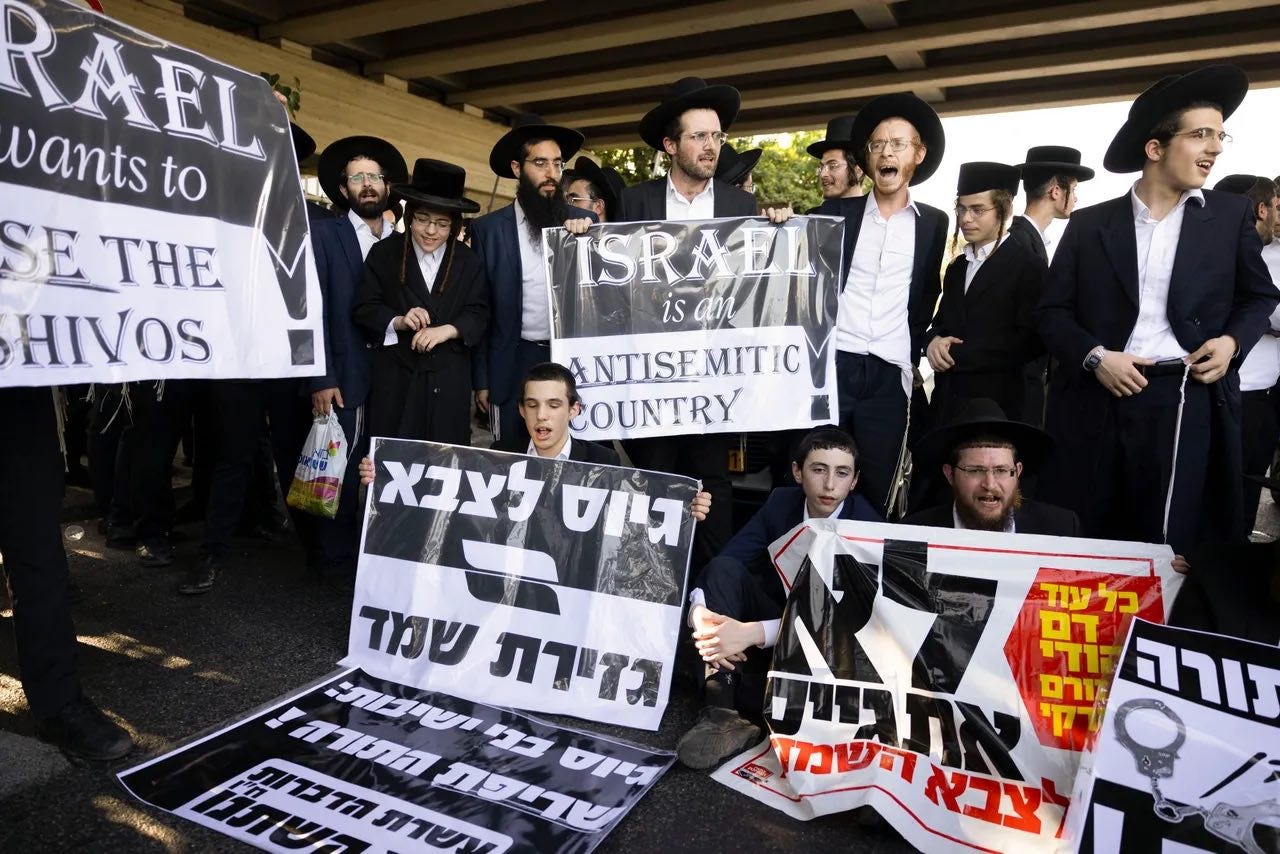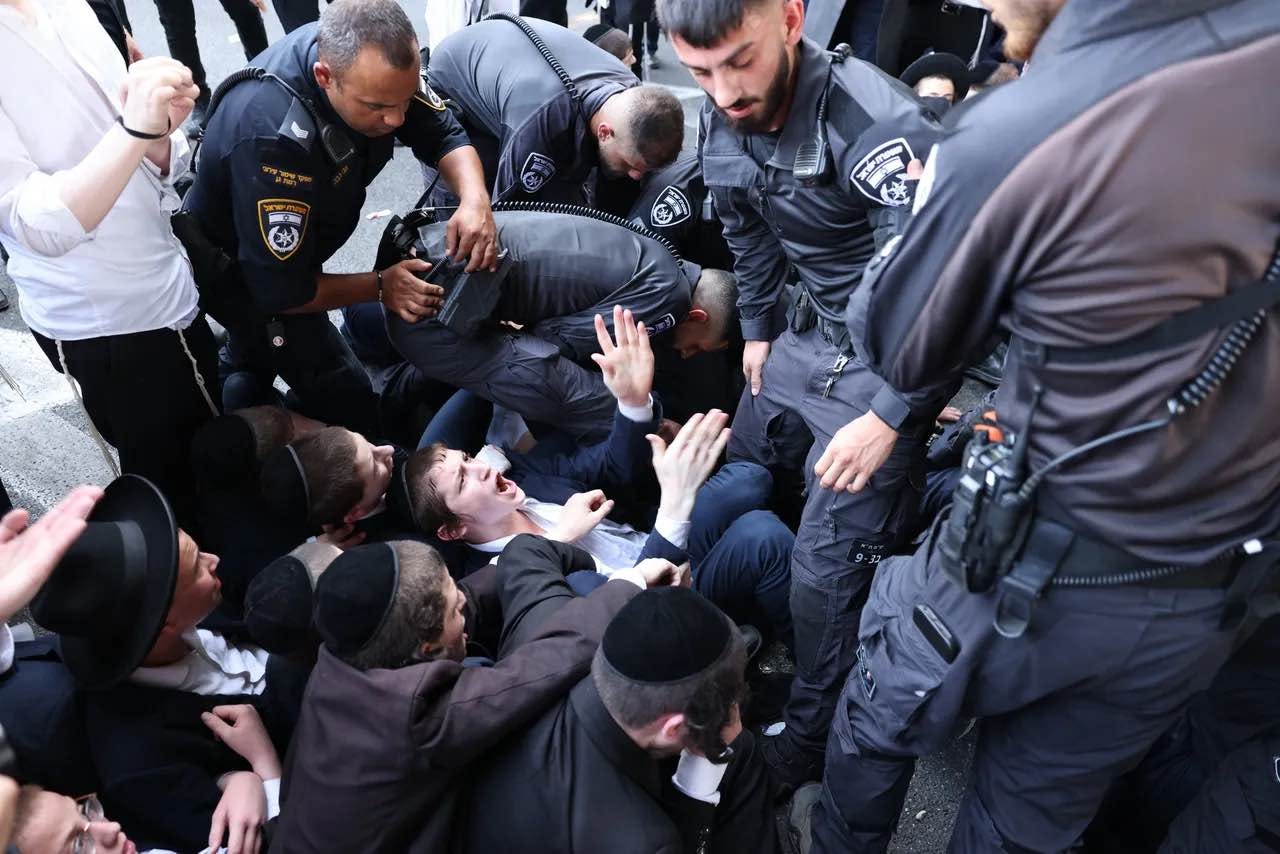An Unkosher State part 3: Jewish Neurodiversity and antiZionism
Conformity and the collapse of a covenant
(Part 1 of the series is here)
Fanatical, uncompromising and wrong
Whatever was going on in Herzl’s psyche, it was no foundation for a healthy political ideology, but perhaps Judaism was due for a change. Christianity had its Reformation in the 16th century and the Jewish religion had changed radically in the past, notably during the Babylonian exile and then again after the Romans destroyed the second temple. The Holocaust was a catastrophe of similar magnitude.

Even before the Nazis, the new thinking of the 19th century had started pushing many Jews towards something more modern. Though most Jews, including Herzl’s own son, were not willing to follow Herzl’s example by abandoning nearly everything Jewish, other modernised expressions of Judaism were on the table. The Reform Jewish movement produced a Declaration of Principles in 1885, shortly before Der Judenstaat was published. Embracing the 19th century spirit of progress also seen in Mill’s On Liberty and Marx’s Communist Manifesto, the founding principles reframe the Messiah not as a ruler but a “modern era of universal culture of heart and intellect.” The Reform movement also let go of a great deal of Mosaic and rabbinical law, “as in our days [it] is apt rather to obstruct than to further modern spiritual elevation”.
They put their money where their mouths were in 1883, with an unkosher banquet at the first graduating class of the (Reform) Hebrew Union College. Several rabbis rushed from the room when the shrimp starter was served, but the president of the college, Rabbi Isaac Wise, called it a great success commenting that their religion “centers not in kitchen and stomach.”
Despite the modernising tendencies, Reform Judaism kept the traditional rejection of the idea of a return to Palestine; it was anti-Zionist at its inception. That all changed with the founding of the state of Israel, however, and perhaps more important was the fact that the post-war allies were politically aligned with it. Jewish communities have long avoided any position in opposition to the states they live in, for obvious reasons, and even built a prayer in support for government into the Sabbath morning service. The state of Israel, as a geopolitical actor, forced Jews to choose between religious loyalties and loyalty to their adopted home countries. Soon a prayer for the state of Israel was also incorporated into the Reform liturgy, and the apologetics began. I remember my rabbi when I was about six years old, sermonising about Israel as a nation in its adolescence, and how we should forgive the mistakes of adolescents. He was talking about the massacres of thousands of Palestinians in the Shatila and Sabra refugee camps during the war with Lebanon.
Orthodox Jews, for their part, still study Talmud; the many Zionists among them presumably ignore the oaths about not founding a state or raising an army to focus on questions of more practical importance, such as what prayer to say when one sees an unusually large animal. Those who still follow Jewish norms are called “ultra-orthodox” or Haredi today, and they continue to reject the state of Israel. Aside from their slightly quirkier clothing, this is their main point of difference from the less-ultra-orthodox. Given that “orthodox” means “correct/straight (ortho-) doctrine/teaching (doxa)” (and ultra-orthodox means “extremely correct teaching”), we seem to be deep into Orwellian territory here, but the matter is not complicated: according to Jewish scripture, a Jewish nation is as “correct” as pork chops for Shabbat dinner.
While many progressive anti-Zionist rabbis argue that the problem is fundamentalism, abandoning fundamental articles of faith is not fundamentalism, it is progressivism, which is why genuine fundamentalists like Rabbi Diskin rejected Zionism as a complete break in Jewish thought. But although much was jettisoned by Zionism, the Messianism was retained and even updated. In a 1962 article in Look Magazine, Israeli Prime Minister David Ben-Gurion shared his own secular Messianic projection for the next 25 years:
In Jerusalem, the United Nations (a truly United Nations) will build a Shrine of the Prophets to serve the federated union of all continents; this will be the seat of the Supreme Court of Mankind, to settle all controversies among the federated continents, as prophesied by Isaiah. Higher education will be the right of every person in the world. A pill to prevent pregnancy will slow down the explosive natural increase in China and India. And by 1987, the average life-span of man will reach 100 years.
All that was required to bring about this vision was the ethnic cleansing of Palestine.
Zionists could be every bit as fanatical and uncompromising as the Maharil Diskin, but they lacked his gift for extreme pedantry. It’s an annoying character trait, for sure, but one thing about pedants is that they are often correct. When my own pedantry flowered I started looking into the stories I’d been told growing up, for example at Reform Synagogue Youth (RSY) Summer Camp in my summer holidays. One game we had played recreated the journey of Jews fleeing Germany by following clues around a classroom. I remember my team being turned away at England due to antisemitic quotas, then again by the USA, and finally arriving in Palestine, starving from lack of provisions but home. Only when I went looking did I learn that the story was disingenuous, because it was due to the lobbying of a small minority of politically expedient Zionists that those quotas had been put in place.
Rabbi Diskin was a zealot who felt a profound responsibility for the religion and culture he represented; he saw where things were going and he was appalled. I have less skin in the game. While any manhandling of language makes me wince a little, I don’t really care how people relate to old books, how convoluted their logic is, or how psychologically damaged the authors of their ideas are. From my perspective - and please don’t take this personally - that’s just how neurotypicals tend to behave when social norms demand it. It’s the collateral damage that upsets me. For me, children no older than mine and no less beautiful bearing the scars of white phosphorus represent unacceptable collateral damage. So is the corruption of one of the world’s oldest and most interesting expressions of human intelligence.
The salvation religious Jews were waiting for was to be brought about by the Messiah himself, personally establishing the promised land. The Reform movement found this Messianic vision rather fanciful, and presumably so did many non-religious Jews at the turn of the 20th century, but neither sought to resettle Palestine. The Jewish Messiah was also supposed to usher in an era of peace where swords would be hammered into ploughshares, and yet Israel was at war within minutes of its foundation. The Talmud places Jews under an oath not to “fight against the nations”, but raising an army was integral to Ben-Gurion’s plan of ethnic cleansing another nation, where “after the formation of a large army in the wake of the establishment of the state, we will abolish partition and expand to the whole of Palestine.” In his words, this would require “brutal compulsion”, and all three militias that formed the Israel Defence Force (IDF) were practiced in brutality: Haganah tortured and assassinated religious Jews; Irgun bombed the King David Hotel killing 91, and was so vicious that even Zionist newspaper Hatsofeh decried them as an “evil gang of fascists”; Lehi sought formal treaties with both Hitler and Mussolini, offering to fight the British alongside the Nazis to form a “new totalitarian Hebrew republic”. Nevertheless, Lehi has not become an anathema in Israel; their operatives were awarded honours and a special ribbon by the Israeli government in 1980.

There were kinder, less fanatical visions of Zionism; Chaim Weizmann, the first president of Israel, proposed that “there must not be one law for the Jew and another for the Arabs”. Though his view that “the life-blood of a society is justice” is admirable, history shows that Israel rejected it and took the path of ethnic cleansing outlined by Herzl, Jabotinsky and Ben-Gurion. Violence is also turned inwards at “ultra-orthodox” Jews from communities that predate 1948. A quick online scan will furnish hours of sickening violence meted out by Israeli cops to black-hatted Jews peacefully protesting the abuses of the state they do not recognise. Recently the ultra-orthodox neighbourhood of Mea Shearim was invaded by soldiers and the Palestinian flags they had raised in solidarity were torn down.
Rabbi Shoshana Menahem describes how the Israeli media views the ultra-Orthodox as “a threat: you do not work, you’re not in the IDF, you don’t take care of the security of the nation, and you have so many children, and so on.” In many ways this rhetoric, and the violence, echoes that levelled at traditional Jews in the ghettos and shtetls of 19th and 20th century Europe.
Rabbi Menahem is one of several autistic rabbis who are vocally critical of Zionism. Rabbi Tzemah Yoreh is another, whose experience in what he calls the IDF “propaganda department” disabused him of his Zionism. It also left him an atheist (this is not an obstacle to being a rabbi, because Jewish observance is concerned with how you behave rather than what you believe.)
A different way of thinking
While autism is probably no more common among Jews than other people, Jewish history seems unique in elevating the most finikity neurodivergent people to positions of leadership. The Talmud, as an encyclopaedia to guide every imaginable detail of life, is a singularly autistic text, recording arguments between rabbis over how to interpret scripture and later arguments over how to interpret the interpretations made in earlier centuries. It is designed to be read by two Torah geeks who would then argue with each other and the rabbis on the page centuries and millennia before them. A later commentator may not overrule the decision made by earlier commentators, but he may employ the most spectacular logical summersaults in order to further complexify the tradition - as long as his conclusion is consistent with the principles of kindness and leniency.
It is comforting for neurodivergent people to have rules to navigate the complexity of social living and morality, especially if those rules have been thoroughly examined for their consistency. Furthermore, the rulings themselves often seem designed to preserve neurodivergent people from stress. One argument that continued even after the Talmud was finished, for example, finally codified in the 16th century exactly how a mezuzah (a little prayer box) should be positioned on the door post. One rabbi says vertical, another says horizontal, and the text concludes that it should be placed at an angle. This respects the logic of both and exalts the principle of compromise. It also deals with the powerful compulsion of some neurodivergent people to correct things that are meant to be straight. Unlike the law codes of nations, there is no punishment for most moral lapses - no one is going to jail for eating a prawn or sneezing during prayer. The consequence is separation from God (and if that doesn’t move you then the searing disapproval of the rabbi might). What does it mean to be separated from God?
Autists tend to be concrete in their thinking; abstractions are alien concepts, and so “separation from God” may refer to something quite real and urgent (even though the language may be unfamiliar). When a neurodivergent person freaks out about something that seems minor to other people, they are likely responding to a powerful sense of disharmony - the same itch for order that drives some autists to tap their left knee if they unwittingly tap their right, or to line up their things neatly. Personally, I don’t care about order in my visual environment, as you would know if you visited my flat, but if your guitar is out of tune, you have to tune it or I have to move out of earshot.
That need for harmony also invades my conceptual sphere: if your behaviour is out of tune with your moral code, and I care about the moral code you say you follow, it gnaws at my brain. Like Rabbi Diskin, I can’t look at you without it troubling me - as if you had some spaghetti on your chin and insisted that you didn’t. My autism is manageable, so I can look at you if I have to - I just absolutely hate it. Even when I try to hide it, my displeasure is obvious in every gesture and syllable. I don’t know enough about God to know what being separate from Him means, but I know when I feel alienated from myself. It is when I act against something deep within me. I have destroyed relationships with several of my dearest friends to resolve the tension.
I suspect that the internal contradictions that disturb autists also disturb neurotypicals, though they may be less hung up about it. They may not even notice, but regardless: internal disharmonies affect us all negatively. Professionals and sensitive people can detect them in various ways too: galvanic skin response, the fluidity of gesture and utterance, Freudian slips, halting responses to word association tests, and outright self-sabotage. Unchecked, these contradictions may develop into complexes that the psyche hides from itself but projects onto other people, and that can lead to all kinds of problems for everyone involved; Herzl is a case in point.
There may be wisdom in this strange Jewish custom of making a certain type of fanatic into an arbitrator of moral conduct. It might be wise to listen to awkward people when they challenge you, even if it is challenging when they do; they certainly aren’t doing it for fun. What might have happened if people had listened to the Maharil’s suggestion “to stop this movement before it is too late” and excommunicated the Zionists? Why didn’t they act on his suggestion? According to Torah Jews, a Jewish anti-Zionist movement:
Some people questioned the need for such an extreme step – the Zionist leaders were known to be irreligious and heretical, and so in any case no good Jew would pay any attention to them. Others warned that the Zionists had support in the gentile world, and fighting them would only backfire. Still others said that it would be impossible to organize such a gathering because the Maskilim (Jews who believed in assimilation) had connections in the governments and they would work hard to prevent the gathering. So in the end, the gathering never took place. Reb Yehoshua Leib was always upset about this and he warned, “A day will come when they will realize the correctness of my suggestion.”
After his death, the Maharil’s anti-Zionist legacy was continued by the man he mentored - Rabbi Yosef Chaim Sonnenfeld, founder of an anti-Zionist, traditionalist movement. I wonder what Rabbi Diskin would have been doing today, were he alive to see the events of 2024. Perhaps he would be flying Palestinian flags in defiance among the Haredi Jews of Mea Shearim, or speaking against the occupation on behalf of an anti-Zionist Jewish movement like Neturei Karta.
What can those of us who feel the discomfort of separation from something of their essence do about it today?
Part 4 - The Reckoning: What the rabbi feared — and what came to pass






